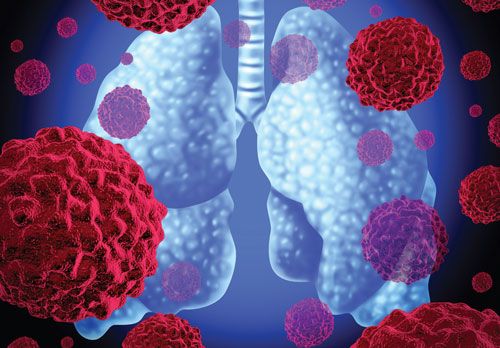Adding Pemetrexed and Carboplatin to Gefitinib Doubled PFS in EGFR-Mutant NSCLC
The addition of pemetrexed and carboplatin chemotherapy to gefitinib doubled progression-free survival and significantly improved overall survival in patients with non–small cell lung cancer harboring an EGFR mutation compared with gefitinib alone, according to results from a randomized phase III clinical <a>trial</a>.

The addition of pemetrexed and carboplatin chemotherapy to gefitinib (Iressa) doubled progression-free survival (PFS) and significantly improved overall survival (OS) in patients with nonsmall cell lung cancer (NSCLC) harboring anEGFRmutation compared with gefitinib alone, according to results from a randomized phase III clinical trial.
The estimated PFS was 16 months with the combination (95% CI, 13.5-18.5) versus 8 months (95% CI, 7.0-9.0) with gefitinib alone (unadjusted HR, 0.51; 95% CI, 0.39-0.66;P=.001). PFS appeared superior in all subgroups evaluated in an unplanned exploratory analysis. OS was significantly improved in the combination arm where the estimated median OS was not reached compared with 16 months (95% CI, 13.5-20.5) with gefitinib alone (unadjusted HR, 0.45; 95% CI, 0.31-0.65; P=.001).
“Adding pemetrexed and carboplatin chemotherapy to gefitinib significantly prolonged PFS and OS but also increased toxicity. The combination of gefitinib, pemetrexed, and carboplatin represents a new standard first-line therapy forEGFR-mutant NSCLC,” Vanita Noronha, MBBS, MD, DM, et al wrote.
The absolute OS improvement was 25%, and 18-month OS rates were 48.7% versus 74.3% in the combination versus control arms, respectively.
The objective response rate was 75.3% (95% CI, 68.3-81.1) with the combination versus 62.5% (95% CI, 55.1-69.3) in the control arm (P=.01). In the combination arm, the best radiologic response achieved was a complete response (CR), which was observed in 5 patients (2.9%), and a partial response was observed in 126 patients (72.4%) compared with 1 patient (0.6%) and 109 patients (61.9%) in the gefitinib alone arm.
Twenty-two patients had stable disease (12.6%), and 9 patients had progressive disease (PD) in the combination arm versus 39patients(22.2%) and 12 patients (6.8%) in the gefitinib alone arm, respectively.
Grade 3 or greater adverse events (AEs) occurred in 123 patients (75%) from the combination arm (95% CI, 67.8-81) and 84 patients (49.4%) in the control arm (95% CI, 43-56.9;P=.001). Clinically relevant serious AEs were more common in the combination arm (50.6%; 95% CI, 43-58.3) than the control (25.3%; 95% CI, 19.4-32.4; P<.001).
In the gefitinib plus chemotherapy arm, 30 patients (16.7%) discontinued pemetrexed as a result of AEs, which included nephrotoxicity in 19 patients, febrile neutropenia in 3 patients, non-neutropenic infection in 3 patients, and gastrointestinal toxicity in 4 patients. In the gefitinib alone arm, 2 patients discontinued therapy due to AEs, interstitial lung disease (ILD) and non-neutropenic infection.
Gefitinib was switched to an alternative oral tyrosine kinase inhibitor (TKI), which was either erlotinib (Tarceva; n = 9) or osimertinib (Tagrisso; n = 2), for 11 patients. Five patients in the combination arm switch therapy due to rash (n = 1), autoimmune hepatitis (n = 1), vomiting (n = 1), and unknown reason (n = 2), whereas 6 patients in the control arm changed therapy due to ILD (n = 3), rash (n = 1), transaminitis (n = 1), and mucositis (n = 1).
Of the patients who had PD, 44 patients (32.4%) in the gefitinib alone arm received pemetrexed and carboplatin after progression. Additionally, 44.4% of patients in this arm received any chemotherapy after PD.
Patients were eligible to enroll for the clinical trial if they had a histologically or cytologically confirmed diagnosis of NSCLC withEGFRmutations in exons 19, 21, or 18. They also had to have an ECOG performance status of 0 to 2. Patients with brain metastases, as well as those with rare EGFRmutations, such as L861Q, S761I, and G719X, were also included in the study.
Patients were randomized 1:1 to receive oral gefitinib once daily (250 mg) alone or in combination with a 10-minute intravenous infusion of pemetrexed (500 mg/m2) and carboplatin as a 30-minute intravenous infusion, both on day 1 of a 21-day cycle for 4 cycles, followed by pemetrexed every 21 days in patients without PD. The primary end point was investigator-assessed PFS, and secondary end points included OS, toxicity, response rate, and quality of life.
Overall, 139 patients (80%) had completed 4 cycles of pemetrexed and carboplatin in the combination arm, 14 completed 3 cycles (8%), 5 patients completed 2 cycles (3%), and 11 patients received 1 cycle (7%). Dose reductions were needed in 22 patients (13%). Additionally, 137 patients (79%) received maintenance pemetrexed for a median of 11 cycles, and 18 patients (13%) had dose reductions in this phase while 67 patients (49%) had dose delays with a median delay length of 10 days. This arm received gefitinib for a median of 327 days and was held in 39 patients (22%) for a median of 7 days cumulatively.
In the control arm, gefitinib was received for a median of 260 days and was held in 51 patients (29%) with a cumulative median hold length of 5 days.
The standard of care for the frontline treatment of patients withEGFR-mutant advanced NSCLC is anEGFR-directed oral TKI, but the study authors conclude the addition of pemetrexed and carboplatin to an oral TKI may improve outcomes in this patient population based on the findings from this study.
Reference:
Noronha V, Patil VM, Joshi A, et al. Gefitinib versus gefitinib plus pemetrexed and carboplatin chemotherapy in EGFR-mutated lung cancer [Published Online August 14, 2019].Journal of Clinical Oncology. DOI:10.1200/JCO,19.01154.
Kim Evaluates New Regimens for EGFR+ Lung Cancer
January 20th 2025During a Community Case Forum event in partnership with the Medical Oncology Association of Southern California, Edward S. Kim, MD, MBA, discussed the FLAURA2 and MARIPOSA trials of newer regimens for EGFR-positive lung cancer.
Read More
Amivantamab/Lazertinib Maintains OS Benefit in EGFR+ NSCLC
January 15th 2025During a Case-Based Roundtable® event, Joshua K. Sabari, MD, continued discussion of key outcomes from the MARIPOSA trial and toxicity management in patients with EGFR-mutated non–small cell lung cancer in the second article of a 2-part series.
Read More